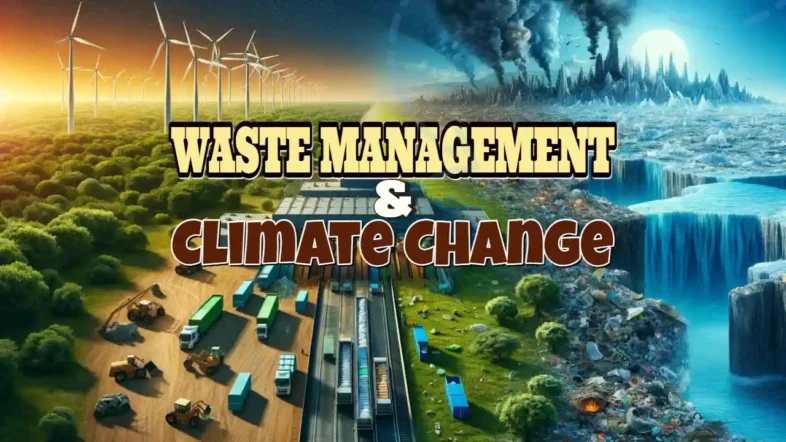Waste management and climate change, or the way we dispose of our trash and the contribution of what we throw away to global warming, is a big issue. The climate change emergency is not all about excessive use of non-renewable energy. It is also about vast global methane-emitting landfills, and how we plan to transition to getting rid of rubbish in ways that help our planet.
It's important because it touches climate change, and with 1.5 degrees of warming already upon us in 2023, it is about how the Earth's weather patterns are changing fast.
Waste is, of course, all the stuff we throw away. When not managed correctly, these things create gases that warm up the earth. Although not massive in themselves, they matter! We are all experiencing the combined effects of so many contributory greenhouse gas emissions, and action is now essential on all contributory sources.
But don't despair, there are new ideas and steps we can take to make less waste and keep our air clean.
The Waste we Produce is Still Rising in 2024
People all over the world are making more waste every year than they did before.
This is bad news for our atmosphere because when rubbish rots in landfills, it lets out gases that trap heat from the sun. These gases are called greenhouse gases, and they're part of why our weather is changing so strangely.
But don't worry; there’s hope! If everyone starts using less stuff and recycles more, we can slow down climate change a lot. Countries can stop putting so much trash into holes in the ground by banning some types of wastes going to these dumps or by asking people to pay money if they really need to use them.
When this happens, there will be fewer harmful gases in the air which keeps both people and nature healthier. We see this through research that tells us throwing things away better cuts down on these bad gases.
Waste Hierarchy Proritizes Waste Minimisation Reuse Recycling and Energy Extraction
Now think about what you throw away—could someone else use it? Or could you use it again somehow? That’s where waste minimisation, reuse, and recycling, come into play (in that sequence of “usefulness”) as a mighty helper against climate change!
Not making the waste in the first place is obviously the best way to avoid environmental and climate damage, but when that's not feasible, reusing it is the next best, and failing that, recycling is usually the next best action. If those can't be done, the third recourse to action is energy recovery (incineration or for organic materials anaerobic digestion.
Machines running on recycled materials can be assumed to save power compared to those starting from scratch growing new stuff, or digging new materials out of the ground.
The whole idea of keeping resources moving around instead of just tossing them out has a fancy name – “circular economy.” It means making sure everything gets used many times before being thrown away, which helps our Earth heaps!
This adventure doesn’t just depend on big companies or nations alone; small actions by normal folks like you and me add up too!
So let's team up ready for action because together we have real power in shaping a cleaner world.
Let's go further into how managing waste smarter plays its part against changing climates!
Key Takeaways
- Waste management affects climate change by increasing greenhouse gas emissions, especially methane from landfills.
- Reducing waste production, recycling more materials, and diverting rubbish from landfills are effective ways to fight global warming.
- Governments can use landfill taxes to discourage dumping in landfills and encourage greener waste practices.
- Individuals, businesses, and communities play a crucial role by committing to sustainable waste methods and supporting recycled products.
- Using principles of effective altruism helps focus on waste management actions that have the most positive impact on the environment.
The Impact of Waste Management on Climate Change

Waste management has a significant impact on climate change, contributing to greenhouse gas emissions and the growing global waste crisis. This has far-reaching environmental implications and underscores the urgent need for sustainable solutions.
Contribution to greenhouse gas emissions
Every step in managing waste, from collecting to disposing of it, contributes to the release of greenhouse gas in the form of carbon dioxide due to the use of fossil fuels. But the gaseous emissions come from decomposing organic waste in landfills, producing methane, a far more potent greenhouse gas.
Transporting rubbish also adds carbon dioxide to the atmosphere as trucks burn fuel, and incineration creates a lot of carbon dioxide.
Nevertheless, choosing sustainable methods can help cut these emissions sharply. Using circular economy strategies, we reduce how much garbage goes to dumps and instead recycle or compost more.
This means lower greenhouse gas levels because recycled materials take less energy to make than new ones, and composting prevents methane production.
Good waste management is not just about keeping our streets clean; it's crucial for tackling climate change too.
Growing global waste
The rise in greenhouse gas emissions is not the only issue. Our planet is facing an ever-increasing amount of waste, too. People around the world throw away mountains of rubbish every day.
This includes plastics, food scraps, and electronic waste. The piles just keep growing.
Managing this trash is a huge task for everyone involved. Waste disposal methods like dump sites harm our environment. They contribute to climate change by releasing methane into the atmosphere. As more landfills are built and add to the carbon dioxide burden, the warming effect accelerates..
It's clear that we must handle waste better to protect our planet and future generations from harm.
Solutions to Reduce Waste-Related Climate Change

To reduce waste-related climate change, it is essential to focus on:
- waste minimisation,
- reuse, and
- recycling, as well as
- the diversion of waste away from landfill.
General sustainable waste management practices, landfill taxation, and cutting down on food waste, are also important strategies for mitigating the impact of waste on climate change.
The aim is zero-waste.

Waste minimisation, reuse, and recycling
Managing waste wisely helps fight climate change. It's crucial to cut down on what we throw away and give items new life through recycling.
- Cut down on waste production: Start by reducing the amount of trash we make. Every business and household can play their part. Choose products with less packaging, buy only what you need, and avoid single-use items.
- Classify your rubbish: Sort out your waste correctly. Put paper, plastic, glass, and metal in separate recycling bins. This makes it easier to recycle them into new products.
- Reuse as much as possible: Before throwing things away, think if someone else could use them. Donate clothes, fix broken appliances, and use scrap paper for notes.
- Embrace recycling: Recycling turns old stuff into new treasures. Recycle bottles, cans, cardboard, and more instead of sending them to landfills.
- Upcycling is trendy too: Get creative by turning waste materials into artwork or furniture. This gives items a second chance at usefulness.
- Support recycled goods: Buy products made from recycled materials when you shop. This encourages businesses to keep recycling and reduces the need for raw materials.
Diversion of waste away from landfill and landfill bans
- Encourage the use of alternative disposal methods: Instead of sending waste to landfills, explore options like composting and anaerobic digestion. These processes break down organic waste and can even produce biomethane, a renewable energy source.
- Implement landfill bans for specific items: Certain materials, like recyclable plastics and metals or organic waste, should not end up in landfills. Banning them encourages people to sort their rubbish more carefully.
- Increase landfill taxes: Making it more expensive to dump waste in landfills will push businesses and consumers to find greener alternatives.
- Promote sustainable materials management: Look beyond the ‘end-of-pipe' treatment of waste. Focus on the lifecycle of products to ensure they are designed with sustainability in mind.
- Advocate for global methane pledge adherence: Push for commitments from governments and companies alike to reduce methane emissions from landfills as part of climate goals.
- Support local food waste prevention programmes: By preventing food waste at its source, we reduce the volume of greenhouse gases produced when food decomposes in landfills.
- Drive innovation in upcycling methods: Invest in new technologies that transform waste materials into valuable products, thus avoiding the need for landfill space.
- Educate about non-biodegradable hazards: Raise awareness around items that take centuries to decompose in landfills, like plastic bags and PET plastics; promote alternatives instead.
Sustainable waste management practices
- Start with reducing what you throw away. Before tossing something, think if it's still useful or if someone else might need it.
- Reuse materials whenever possible. Old jars can become storage containers, and clothes can be donated for a second life.
- Recyclables like paper, plastic, and metal should go into recycling bins. This keeps them out of landfill where they take ages to break down.
- Composting food scraps turns waste into nutrient-rich soil. It also cuts down methane gas from rotting food in landfills.
- Choose products with less packaging to begin with. By doing so, there's less to dispose of later.
- Support businesses that use recycled materials in their products. This helps create a market for things we recycle.
- Educate those around you about recycling right – not all plastics go in the bin!
- Make sure electronic waste goes to special recycling spots. They have hazardous parts that shouldn't end up in regular rubbish.
- In construction, use materials wisely and plan to reduce leftover scraps.
Landfill taxation
Governments impose landfill taxes to push for more eco-friendly disposal methods. These taxes make it more costly to dump waste into landfills, encouraging businesses and the public to think twice about how they handle rubbish.
The higher cost drives innovation in recycling and composting. It also funds environmental projects which can further help reduce emissions.
Money from landfill taxes often supports recycling programs or cleaner technologies. It helps cut down greenhouse gases released from rotting waste, like methane—a potent climate change driver.
By making dumping trash more expensive, people find new ways to manage their rubbish that don't hurt our planet as much.
Next up is the role of individuals, businesses, and communities in this effort.
Role of Individuals, Businesses, and Communities
Individuals, businesses, and communities play a crucial role in reducing waste-related climate change by pledging to cut down on waste, embracing sustainable solutions, and using effective altruism principles.
To learn more about how you can make a difference in the fight against climate change through waste management, keep reading.

Pledge to reduce waste
Reducing waste plays a crucial role in tackling climate change. Both individuals and businesses can make a significant impact with small changes.
- Commit to cutting down on single-use items, such as plastic bags and bottles. Opt for reusable options like cloth bags and refillable water containers.
- Start composting food scraps and yard waste. This reduces methane emissions from landfills and creates nutrient-rich soil for gardens.
- Choose products with less packaging or buy in bulk. Less packaging means fewer materials that need recycling or disposal.
- Support companies that use recycled materials in their products. Buying these goods encourages more recycling of materials like plastic, paper, and aluminium.
- Repair items when possible instead of replacing them. Fixing electronics, clothing, and furniture extends their life cycle.
- Donate usable goods instead of throwing them away. Charities welcome clothes, books, appliances, and toys for reuse.
- Educate family, friends, and colleagues about the importance of reducing waste. Sharing knowledge helps spread sustainable practices.
- Set clear goals for reducing personal or business waste output. Monitoring progress keeps everyone accountable.
Use of effective altruism principles
Individuals, businesses, and communities can make a significant impact on waste management and climate change by embracing effective altruism principles. By prioritizing actions that maximise positive outcomes for both the environment and society, such as supporting sustainable waste management practices and reducing waste generation, we can collectively contribute to mitigating climate change.
This approach aligns with the goal of promoting environmental sustainability while considering the broader implications for global well-being. Understanding how our choices in waste management affect greenhouse gas emissions directly empowers us to make informed decisions that benefit the planet and future generations.
Moving forward with a focus on effective altruism principles will guide us toward more impactful strategies in addressing waste-related climate change challenges. Embracing this mindset encourages collaborative efforts toward sustainable solutions across various sectors, ultimately creating a more resilient and environmentally responsible society.

Embracing sustainable waste solutions
Embracing Sustainable Waste Solutions:
- Implement waste minimisation, reuse, and recycling strategies to reduce the amount of waste generated and promote a circular economy, in line with the principles of sustainable development.
- Divert waste away from landfill by encouraging the use of alternative disposal methods such as composting, anaerobic digestion, and incineration with energy recovery, reducing greenhouse gas emissions associated with traditional landfill disposal.
- Advocate for sustainable waste management practices that prioritise the reduction of environmental impact through the adoption of recyclable materials and upcycled products, minimising resource depletion and pollution.
- Support initiatives for landfill taxation to incentivise responsible waste disposal practices and steer towards a more sustainable approach that reduces greenhouse gas emissions from landfilled waste.
- Utilise effective altruism principles to guide decision-making regarding waste management options, emphasising the importance of maximising positive environmental impact and reducing harm caused by anthropogenic global warming.
- Encourage the use of environmentally friendly alternatives to single-use plastics to mitigate their negative impact on climate change and reduce the accumulation of plastic waste in natural environments.
- Engage in kerbside recycling programmes to increase the recapture of valuable materials from municipal solid waste streams, contributing to reduced energy consumption and greenhouse gas emissions associated with primary material production.
- Emphasise the importance of embracing sustainable waste solutions within communities, businesses, and local authorities to collectively address climate change mitigation efforts while promoting environmental justice and food security.
- Foster collaboration among stakeholders to promote sustainable consumption practices that minimise wasted food, lower greenhouse gas emissions associated with food production and transportation, and contribute towards global methane budget reductions.
- Work towards implementing innovative technologies such as radio frequency identification systems in waste management processes to enhance efficiency, optimise resource utilisation, minimise pollutants, and improve energy efficiency in handling solid wastes.
Conclusion: Collaboration in the Fight Against Climate Change and Waste Management
Waste management directly impacts greenhouse gas emissions. It plays a crucial role in addressing climate change. Sustainable waste practices aid in reducing emissions from various sectors.
Reuse and recycling are key strategies for waste reduction. Businesses and communities can pledge to reduce waste. Effective altruism principles can guide waste management decisions.
FAQs
1. How does waste management impact climate change?
Waste management affects climate change mainly through GHG emissions from decomposing waste. When solid waste breaks down in places like open dumps or landfills, it releases methane—a potent greenhouse gas. Reducing waste and managing it sustainably can lower these emissions.
2. What role do recycling and reusing play in tackling climate change?
Recycling and reusing materials dramatically cut down on global greenhouse gas emissions. For instance, recycled aluminium saves up to 95% of the energy compared to new aluminium production—energy that often comes from burning coal or petrol.
3. Can you explain what ‘waste hierarchy' means?
The term ‘waste hierarchy‘ refers to the “reduce, reuse, recycle” approach—it's a guide for managing resources and reducing waste properly! This method helps us choose options that create less waste first, like using fewer frozen foods to avoid packaging or turning leftovers into jams instead of wasting them.
4. Are there solutions for organic waste other than dumping it in landfills?
Absolutely! Instead of sending food scraps and garden clippings to sanitary landfills where they release landfill gas, we could use methods like anaerobic digestion—which turns this rubbish into energy—or composting it for gardening which is good but not as super energy efficient!
5. Is sustainable solid waste management part of international agreements on climate change?
Yes indeed! The Paris Agreement recognises the importance of proper solid waste management when fighting the effects of global warming—it’s a key aspect in lowering overall GHG emissions across nations.
6. Can individuals make a real difference with their own household's trash handling regarding sustainability?
Every single person makes an impact when they manage their municipal wastes wisely; by cooking only what you'll eat—so no vegetables end up being thrown out—or opting for items without lots of packaging leads directly to significant reductions in global greenhouse gas emissions.






